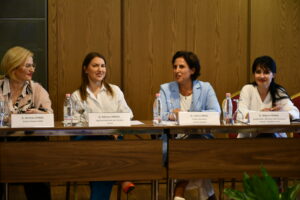
Më 25 Qershor 2025, në ambientet e Hotel Mondial në Tiranë, Caritas Shqiptar organizoi Tryezën e Rrumbullakët me temë “Institucionalizimi i Praktikave Profesionale të Paguara në Shqipëri” në kuadër të programit YourJob me financim te Agjencisë Austriake për Zhvillim, Renovabis, Secourse Catholique dhe Caritas Austria. Ky takim mblodhi së bashku përfaqësues të institucioneve publike dhe të shoqërisë civile për të ndarë ide, përvoja dhe rekomandime mbi fuqizimin e të rinjve dhe përfshirjen sociale.
Eventi u hap me fjalën përshëndetëse të Drejtoreshës së Caritas Shqiptar, znj. Juljana Reso, e cila theksoi misionin humanitar të Caritasit dhe përkushtimin e tij për më shumë se tri dekada në shërbim të njerëzve në nevojë. Ajo prezantoi programin YourJob si dhe arritjet kryesore te ketij program nder vite me shembuj të suksesshëm të inserimit te te rinjve ne tregun e punes duke ofruar një ndikim të qëndrueshëm në komunitet.
Pjesëmarrëse e nderuar në këtë aktivitet ishte edhe znj. Adriana Spahiu, përfaqësuese e Agjencisë Austriake për Zhvillim në Shqipëri, e cila vlerësoi impaktin pozitiv të programit YourJob dhe përkushtimin e tij në fuqizimin e të rinjve në zonat e zbatimit të këj programi. Znj. Spahiu përgëzoi Caritasin Shqiptar për zbatimin me sukses të këtij programi dhe për rezultatet e larta të arritura në zonat ku ai zbatohet, duke theksuar rëndësinë e mbështetjes së vazhdueshme për të rinjtë, si një mënyrë konkrete për të ndërtuar një të ardhme më të sigurt dhe të qëndrueshme për ta. Ajo theksoi se ky bashkëpunim është një shembull i mirë i ndërveprimit efektiv midis organizatave ndërkombëtare, shoqërisë civile dhe aktorëve lokalë në adresimin e sfidave të papunësisë dhe përfshirjes sociale të të rinjve.
Ndër të ftuarat kryesore ishte znj. Gertiola Cepani, Drejtoreshë pranë AKPA Qendrore, e cila ka qenë pjesë e grupit të punës për realizimin e dokumentit të advokacisë mbi praktikat e profesionale të paguara. Ajo solli në fokus sfidat dhe politikat aktuale të punësimit për të rinjtë, duke theksuar rëndësinë e bashkëpunimit ndërinstitucional dhe mbështetjen për rritjen e pagesës minimale për praktikantët.
Fjalë përshëndetëse mbajti edhe znj. Migena Spaho, Drejtoreshë e Mbrojtjes dhe Përfshirjes Sociale në Bashkinë Tiranë, e cila ndau disa nga nismat konkrete të Bashkisë për angazhimin dhe përfshirjen e të rinjve në jetën socio-ekonomike të qytetit. Bashkëpunimi me Caritas Shqiptar ka qenë dhe vijon të jetë i fortë, me një ndikim të lartë social. Ajo vlerësoi gjithashtu Caritasin si një organizatë që meriton mirënjohje për punën e palodhur në komunitet me grupet në nevojë, duke qenë gjithmonë pranë shtresave më të margjinalizuara të shoqërisë.
Paneli i tryezës përfshiu gjithashtu znj. Klaudia Hasanllari, Drejtoreshë pranë Qendrës së Parandalimit të Krimeve të të Miturve dhe të Rinjve, Ministria e Drejtësisë. Në fjalën e saj, znj. Hasanllari vlerësoi bashkëpunimin e vazhdueshëm dhe të frytshëm me Caritasin Shqiptar, veçanërisht në kuadër të iniciativave për ri-integrimin social dhe profesional të të miturve në konflikt me ligjin. Ajo theksoi rëndësinë e ofrimit të mundësive reale për zhvillimin e aftësive përmes praktikave të punës të strukturuara dhe të mbështetura, si një mënyrë konkrete për të ndihmuar këta të rinj në rrugën drejt një të ardhmeje më të sigurt dhe të qëndrueshme.
Në vijim, znj. Juliana Bici, Menaxhere e Programit YourJob, prezantoi rezultatet konkrete të programit në fushën e këshillimit, formimit professional, internship, startupe dhe orientimit drejt tregut të punës për rreth 3000 të rinj në Shqipëri. Programi YourJob zbatohet në disa zona të vendit, përfshirë Shkodrën, Bushatin, Lezhën, Rrëshenin, Kamzën, Kurbinin dhe Tiranën. Rezultatet e arritura kanë qenë domethënëse, duke pasur një ndikim të ndjeshëm dhe pozitiv tek të rinjtë dhe komunitetet ku programi është zbatuar.

Një nga momentet kyçe të takimit ishte prezantimi i dokumentit të advokacisë për institucionalizimin e praktikave të paguara, i hartuar mbi bazën e modelit të zbatuar nga Caritas në kuadër të programit YourJob. Prezantimi u realizua nga znj. Enkelejda Qama, Drejtoreshë e Departamentit Social në Caritas Shqiptar, e cila ndau me pjesëmarrësit rekomandi
met kryesore të dokumentit. U theksua rëndësia që ky dokument të mos mbetet vetëm në letër, por që institucionet përgjegjëse të marrin masa konkrete për zbatimin e tij, duke sjellë një ndikim të drejtpërdrejtë te të rinjtë përmes rritjes së pagesave dhe motivimit të tyre.
Në mbyllje të këtij eventi kaq të rëndësishëm, Drejtoresha e Caritas Shqiptar theksoi rolin thelbësor të institution publike dhe të shoqërisë civile në avancimin e këtyre nismave. Ajo nënvizoi se vetëm përmes një bashkëpunimi të vërtetë mund të ndërtojmë politika më të drejta, shërbime më gjithëpërfshirëse dhe një shoqëri ku askush nuk mbetet pas.

